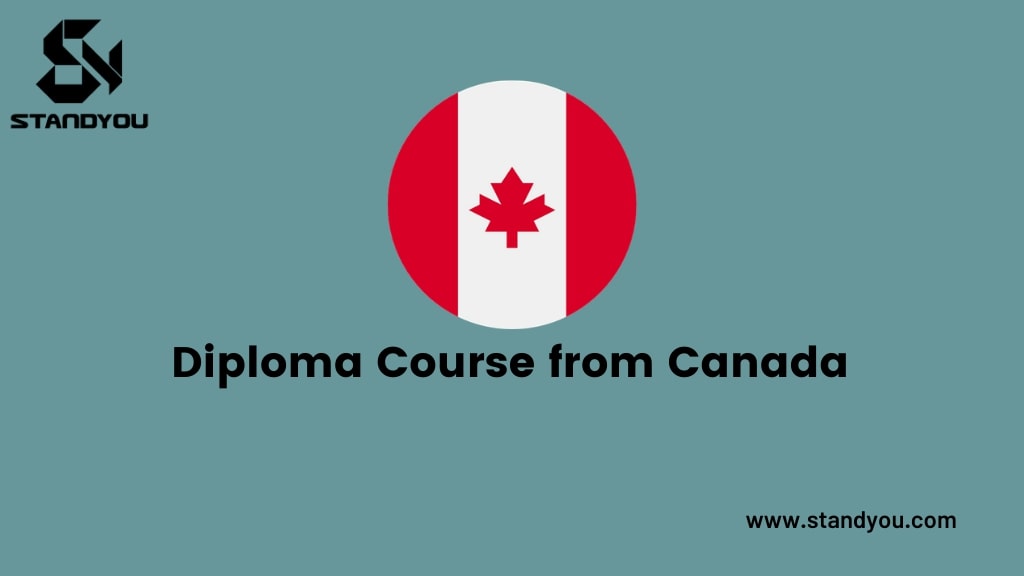Looking for Diploma courses in Canada? Check the course and eligibility in Canada. ....

Jun 16, 2020 04:03:13

Diploma is a certificate issued by an educational institution, such as college or university on successful completion of a particular course of study. The diploma is a short term course generally of 2 or 3 years which mainly focuses on training students in a particular field. Diploma’s curriculum offers students to get more practical knowledge on the particular course which naturally builds the skills of the students.
|
Diploma |
Degree |
|
A diploma is a short term course. |
A degree is a long term course. |
|
A diploma is a specific academic award usually awarded for professional/vocational courses. |
Typically, there is one subject that you major in, called the specialization whereas other subjects are called electives. |
|
Diploma programs provide education within your given field and get you into the workforce sooner. |
Degree programs give more in-depth knowledge and potentially start you at a higher level. |
|
Diplomas can be completed in significantly less time. |
Degrees take more time as compared to diplomas. |
Canada is one of the most highly developed countries in the world. Canada is also ranked no.1 in the world for its quality of life.
Some of the benefits of making Canada your education destination are:
You will learn with the best and brightest: Canada is recognized worldwide for our outstanding quality of education—from elementary school to post-secondary studies. Here educators are highly trained and bring diverse perspectives to the classroom. At the university level, 2 out of every 5 academics hold at least one international degree.
The cost of study and live here is affordable: Canada is known for having some of the lowest university tuition fees among English-speaking countries. There are various scholarships and programs for students from all across the globe so that they can be benefitted and can get the best quality of education.
Canada is considered one of the safest countries in the world for students. One of the greatest things about studying in Canada is the opportunity to experience a climate, culture, and way of life that is beyond compare.
A number of diplomas include a work-internship also known as a co-op program. Co-op programs offer students a real-time industry experience.
In Canada, the most popular Diploma courses are in the following subjects:
You can receive this diploma in such universities as: Oxford College (Professional Diploma in Office Administration Dental and Medical, Professional Diploma in Medical Office Assistant, Professional Diploma in Accounting and Payroll Administration), Reeves College (Diploma in Logistics & Supply Chain Management), CDI College (Diploma in Logistics & Supply Chain Management, Diploma in Human Resources Administration, Diploma Medical Office Administration, Diploma Help Desk Analyst, Diploma in Legal Administration).
College Boreal (Architecture Techniques, Architectural Technician)
Oxford College (Professional Diploma in Video Game Designer), LaSalle College Vancouver (Diploma in Digital Photography, Diploma in Game Art & Design, Diploma in Visual & Game Programming, Diploma in Animation Art & Design, Diploma in 3D Modelling for Animation & Games), Sault College (Diploma in Video Game Art) ,CDI College (Diploma in 3D Modelling Animation & Design), Centre for Arts and Technology (Electronic Music Artist) , Trios College (Video Game Design & Development Diploma) Vancouver Career College (Diploma in Computer-Aided Design and Drafting Specialist).
Toronto School of Management (Diploma in Business Administration Co-op), Vancouver Career college (Diploma in Business and Digital Marketing Management), CDI College (Diploma in Business and Digital Marketing) ,Focus College (Higher National Diploma in Business), Oxford College (Professional Diploma in Business Management) ,London Language Institute (Diploma in Software Development and Technology Entrepreneurship), Sault College (Diploma in Business) Centennial College ,(Fashion Business and Management), Canadian College (Diploma in Business Management and Co-op), LaSalle College Montreal (Diploma in Business Management, Diploma in Entrepreneurship & Restaurant Ownership).
Easton Education (Diploma of Accounting & Finance Essentials), Oxford College (Professional Diploma in Accounting and Payroll Administration),LaSalle College Montreal (Diploma in Insurance and Financial Advisory Services, Diploma in Accounting and Management Technology), Centennial college (Diploma in Business Accounting),Sault College (Diploma in Business - Accounting), Morgan International (Diploma in International Financial Reporting).
Diploma fee: $10000 to $15000
Bachelor degree fee: $20000 to $35000
PG diploma fee: $10000 to $18000
Master degree fee: $20000 to $40000
Living expenses: $10000
Pick what suits you best. What are your interests? Will you be going for employment after the course, or a Master’s program? Is it a one-year program or two-year program? Once you get all the answers, shortlist two or three best picks to go ahead with. Keep in mind that more than 70% of the international students in Canada enrol in diploma courses in Canada, as the Universities ask for 16 years of schooling before Bachelor’s program. The admission is competitive and you will have to be on your toes before 8 to 10 months of the start of the term.
The next step is to submit the academic proofs. Here is the list of documents required:
Documents required for Diploma Courses in Canada:
The document required may differ from college to college as the application process/requirements are different for all institutes. You will have to check the website of the colleges you have shortlisted, about the requirements. Here is a list of documents that most colleges ask for in Canada.
1. A Valid Passport:
Ideally, you should have a passport that is valid till about 6 months after your intended course completion date. For instance, if you are applying for a 2-year course, starting August of 2016, which would end by August 2018, then your passport should be valid at least until February 2019.
2. Academic Transcripts:
You would need your marks/ result for all classes from Class 9 and upwards. If you are still in class 12, then you would need the result of class 9, 10 and 11. If you are applying for PG diploma, you would also need the mark sheets or your bachelor degrees (all year scores, as well as a cumulative score, would be required).
3. Proof of Funds:
This is a rather important aspect of your application. While you need not provide actual proof, you would still need to fill rather detailed financial information about your family. This information is used by the college for determining both your eligibility (sometimes of a scholarship) as well as the ability to afford the education. So, you need to have all the relevant information like Tax Returns, etc.
IELTS or TOEFL are usually not mandatory in Canada for diploma courses, if you have studied English up to standard 12. If your scores are satisfactory, you may get admitted without the additional requirement of appearing for any language exam. However, depending on a case-to-case basis, the college may ask you to provide IELTS or TOEFL scores.
Based on your program, you might be asked to provide additional documents. The additional documents require an SOP (statement of purpose) or sometimes LOR (letter of recommendation),which states your academic background, and your future goals regarding the college and career.
If the subject is more towards the arts, a portfolio can be asked for music, art, and other similar courses. The SOP is sometimes called a letter of intent, and you can find the details on the respective college’s website for additional requirements.
The next step will be the payment of the fees. The average fee in Canada for diploma courses is $15000/year. However, as it has been the case with every step, it will change with programs and Colleges in Canada. You will be given a deadline to pay your fees. Make sure you pay the fees before the deadline or the offer may be withdrawn. The fees are refundable, but depending on the reasons of the refund, some charges will be there. If you are willing to apply for the scholarships, keep the deadlines in the mind. The application deadlines of the scholarships 3-5 months before the start of the semester, and they are limited in number.
Once you have submitted all the documents and have paid your fees, now is the time to wait. The colleges will take their own time to process the application and revert. It can be two to three weeks, and it can be more than that, too. If you are selected for the program, you will receive a letter of acceptance from the college.
Student Partners Program (SPP) is a joint pilot project between Citizenship and Immigration Canada's visa offices in India and the Association of Canadian Community Colleges (ACCC). Launched in April 2009, the main objective behind this program was to simplify admission and visa process for Canadian Community Colleges which would increase the number of visas issued to Indian students for studying at Canadian Community Colleges. A large number of Indian students apply to various specialized trade requirement based diplomas and Postgraduate diploma programs at Community Colleges in Canada.
Students planning to pursue studies in Canada can apply to any of the participating SPP colleges. Applications under this program receive prompt processing and a fair decision based on the documents given by the students. In case an applicant meets the eligibility criteria of the college applied to, then he/she will be considered under the SPP program.
As mentioned above, students need to fulfill the eligibility criteria for their application to be considered under the SPP program. Those applying for a program under SPP must meet the following eligibility criteria:-
An overall IELTS score of 6.0 with no band less than 5.5. The test score must not be older than two years.
A study gap of no more than five years is allowed, with certain exceptions made for students with a three-year gap who have excellent grades with work experience.
Not more than 8 backlogs in recent studies are accepted under SPP.
The course applied must be relevant to the student’s previous study background and must add value to the previous education.
Minimum 50% score in their recently completed degree as per the SPP institution-specific requirement.
Students with previous study visa rejection are not allowed to reapply under SPP visa category.